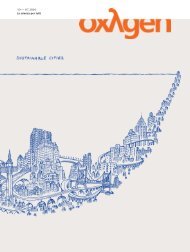Annual Report 2010 - Enel.com
Annual Report 2010 - Enel.com
Annual Report 2010 - Enel.com
Create successful ePaper yourself
Turn your PDF publications into a flip-book with our unique Google optimized e-Paper software.
Ethics consists of:<br />
> general principles regarding relations with stakeholders,<br />
which define the reference values guiding the<br />
Group in the carrying out of its activities. Among the<br />
aforesaid principles, specific mention should be made<br />
of the following: honesty, impartiality, confidentiality,<br />
the creation of value for shareholders, the value of human<br />
resources, the transparency and <strong>com</strong>pleteness of<br />
information, service quality, and the protection of the<br />
environment;<br />
> criteria of behavior towards each class of stakeholders,<br />
which specify the guidelines and rules that <strong>Enel</strong>’s officers<br />
and employees must follow in order to ensure observance<br />
of the general principles and prevent the risk<br />
of unethical actions;<br />
> implementation mechanisms, which describe the control<br />
system devised to ensure observance of the Code<br />
of Ethics and its continual improvement.<br />
The revision of the Code of Ethics carried out in September<br />
2009 and ended in February <strong>2010</strong> was prompted by<br />
the necessity of updating this document in the light of<br />
the legal and organizational changes that had taken place<br />
since its previous version was published, as well as the intention<br />
to further align its content with international best<br />
practice. Among the most significant amendments made at<br />
that time were (i) the updating of the corporate mission,<br />
(ii) adoption of the prohibition of intimidation, mobbing,<br />
and stalking in the workplace, and (iii) an express provision<br />
of the obligation for suppliers to <strong>com</strong>ply with regulations<br />
regarding health and safety in the workplace, as well as (iv)<br />
the exclusion in principle of the possibility for Group <strong>com</strong>panies<br />
to grant requests for contributions for the same kind<br />
of activities in which <strong>Enel</strong> Cuore Onlus is engaged.<br />
Compliance program<br />
pursuant to Legislative<br />
Decree 231 of June 8, 2001<br />
In July 2002, the Company’s Board of Directors approved<br />
a <strong>com</strong>pliance program in accordance with the requirements<br />
of Legislative Decree 231 of June 8, 2001, which<br />
introduced into the Italian legal system a regime of administrative<br />
(but in fact criminal) liability with respect to<br />
<strong>com</strong>panies for several kinds of crimes <strong>com</strong>mitted by their<br />
directors, executives, or employees in the interest of or to<br />
the benefit of the <strong>com</strong>panies themselves. The content of<br />
the aforesaid program is consistent with the guidelines on<br />
the subject established by industry associations and with<br />
the best practice of the United States and represents another<br />
step towards strictness, transparency, and a sense<br />
of responsibility in both internal relations and those with<br />
the external world. At the same time, it offers shareholders<br />
adequate assurance of efficient and fair management.<br />
The program in question – conceived as an instrument to<br />
be adopted by all the Italian <strong>com</strong>panies of the Group –<br />
consists of a “general part” (in which are described, among<br />
other things, the content of Legislative Decree 231/2001,<br />
the objectives of the program and how it works, the duties<br />
of the control body responsible for supervising the<br />
functioning of and <strong>com</strong>pliance with the program and seeing<br />
to its updating, and the penalty regime) and separate<br />
“special parts” concerning the different kinds of crimes<br />
provided for by Legislative Decree 231/2001, which the<br />
aforesaid program aims to prevent.<br />
During 2006, the <strong>com</strong>pliance program was <strong>com</strong>pletely revised.<br />
As proposed by the Internal Control Committee, the<br />
Board of Directors (i) updated both the “general part” and<br />
the “special parts” regarding corporate crimes and crimes<br />
against the civil service, in order to take into account court<br />
rulings and the applicative experience acquired during the<br />
first years of implementation of the program, and (ii) approved<br />
new “special parts” concerning crimes of terrorism<br />
and subversion of the democratic order, crimes against<br />
the person, and crimes and administrative wrongdoing<br />
involving market abuse.<br />
In February 2008, the Board of Directors approved an additional<br />
“special part” of the program in question concerning<br />
the crimes of negligent manslaughter and personal<br />
injury <strong>com</strong>mitted in violation of the regulations for the<br />
prevention of industrial accidents and the protection of<br />
workplace hygiene and on-the-job health.<br />
At the same time, the Board of Directors also updated the<br />
<strong>com</strong>position of the body entrusted with the supervision<br />
of the functioning and observance of the program and<br />
with seeing to its updating, which was transformed from<br />
a one-member body into a collective one in order to bring<br />
its characteristics into line with the prevalent practice of<br />
the most important listed <strong>com</strong>panies and the trends of<br />
court decisions.<br />
In accordance with the regulation of the supervisory body<br />
approved by the Board of Directors in May 2008, such<br />
body may consist of three to five members appointed by<br />
the Board. Such members may be either from within or<br />
279









